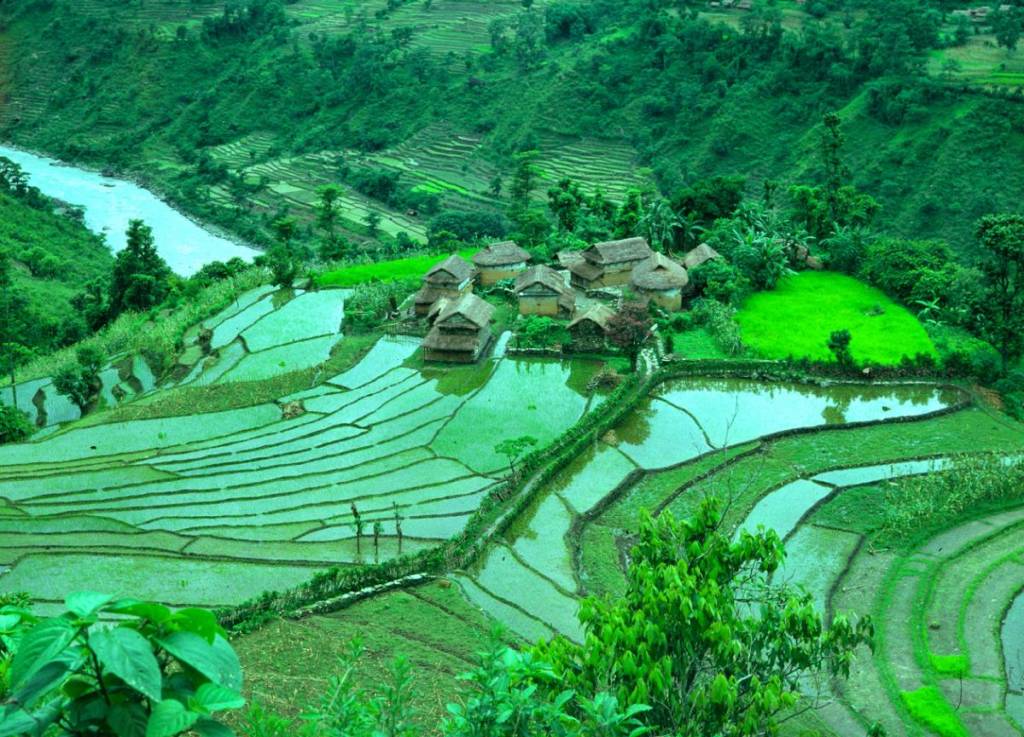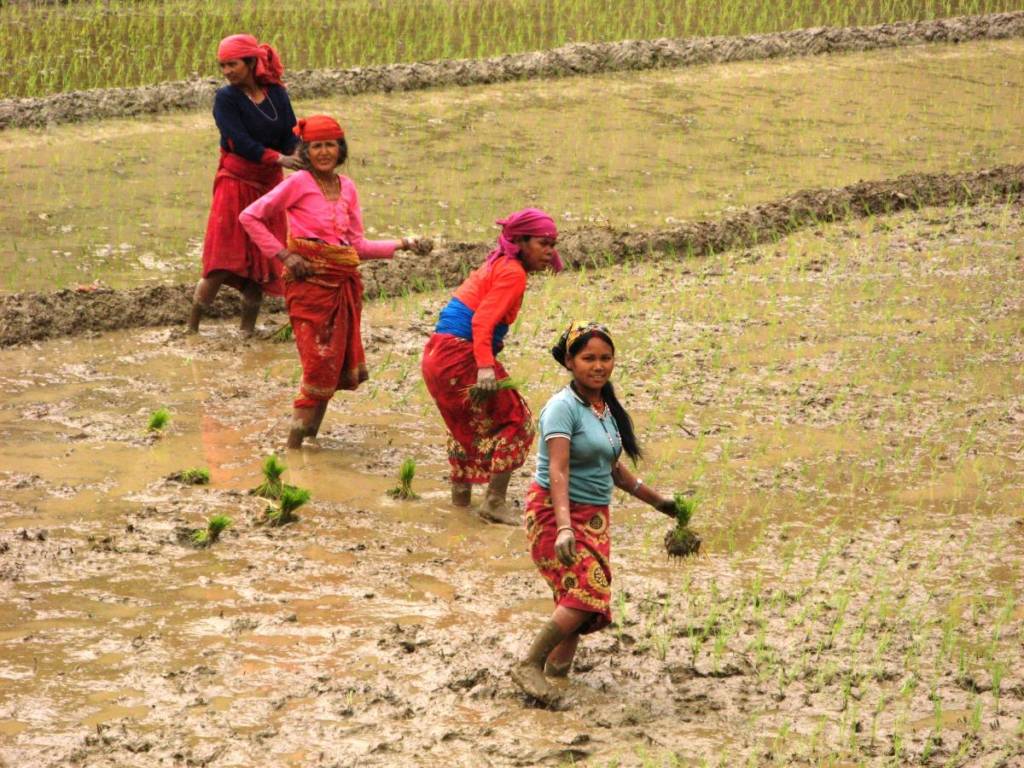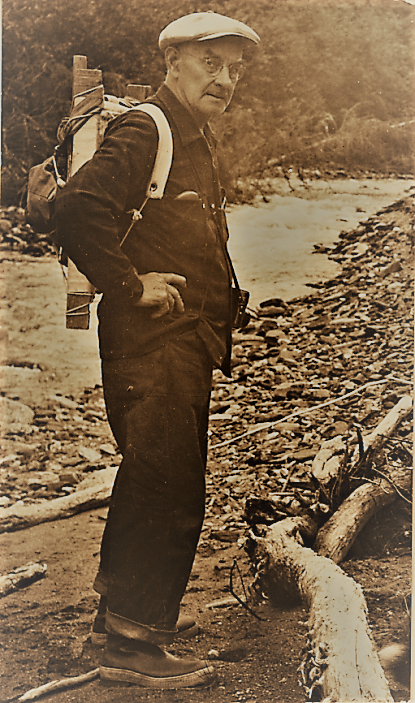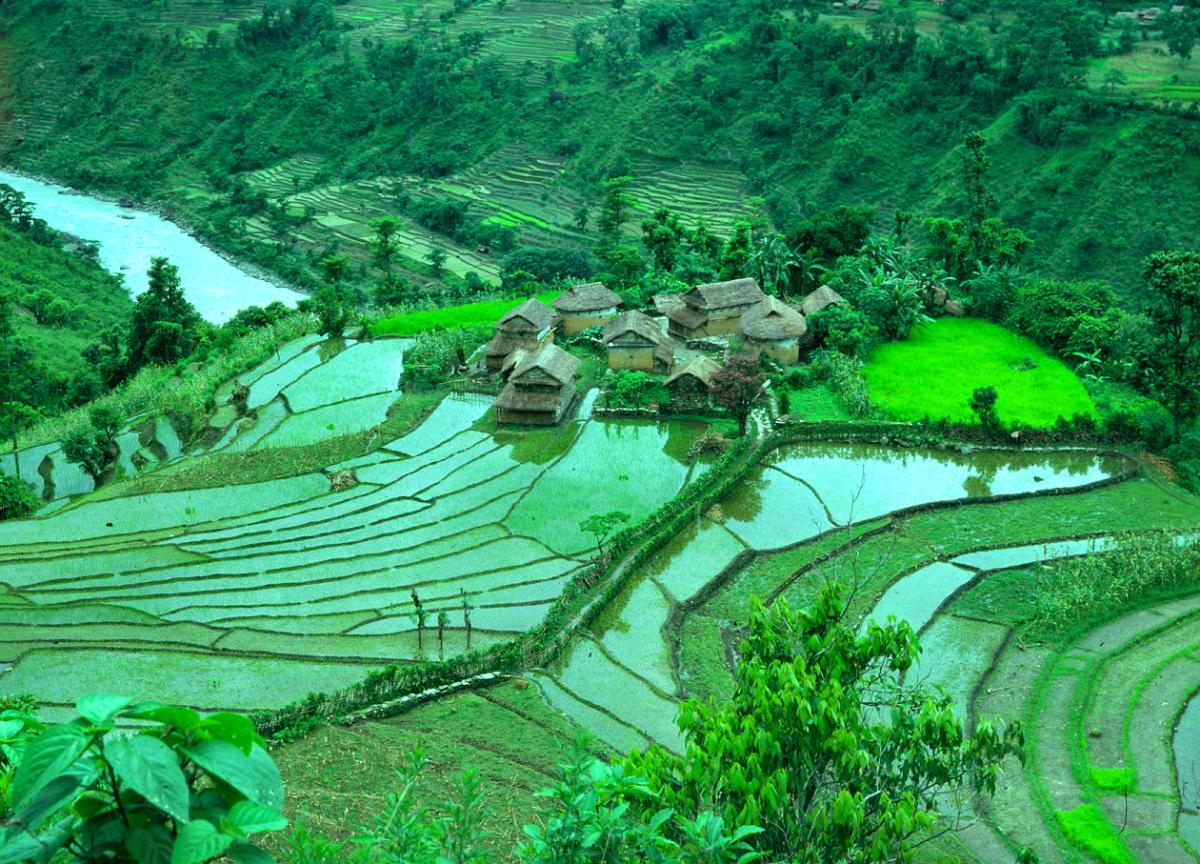
One Wednesday morning late in the rainy season of 1964, I sat at the open window of my room overlooking the tiny hill town of Kunchha, where I lived. I was watching huge clouds expand overhead, upward and outward across the blue Himalayan sky. I knew that by noon the temperature and the humidity would rise proportionately. Those cumulonimbus clouds are the largest, most magnificent and dramatic of the nimbuses, and experience told me that they were the harbingers of a rainstorm that would blow in around tea time.
At first, the weather that morning seemed no different from any other morning since June when ‘the rains’ began. But, while the clouds looked the same as always, there was something about them that nagged at the back of my mind, something foreboding. Even now I can feel it, much as I had then. At that time, in that place, my semi-conscious mind seemed to be playing a game with me, inexplicably evoking strong memories of my maternal grandfather who lived thousands of miles away in Alaska.
I occasionally thought of Grandpa while I was living and working far off in the Himalayas as a Peace Corps volunteer. I remember him with a touch of nostalgia even now, all these decades later. But on Wednesday, August 26th, while watching the sky brim with clouds, I felt as if he were there in Kunchha with me, if only in spirit.
In my youth, Grandpa and I had been very close. While growing up in Alaska, he had been like a father to me, introducing me to nature and the outdoors. He taught me about trees and flowers, wild animals and birds, and the weather, especially how to ‘read’ the clouds and foretell storms.
Grandpa was already nearing 70 when we bonded, and like so many elders with a philosophical bent, he would tell me (then an inexperienced youth) about the wonders and mysteries of the world. He was something of an armchair mystic who, with candid fascination, often pondered aloud his own mortality.
On the cold, rainy day in September 1963 when I left Alaska to join the Peace Corps, Grandpa joined my parents to see me off at the Juneau airport. It was there that he had quietly told me something like this: You are young, Don, and today you are starting out on a grand adventure. It’s one I’d like to have done. But my adventures are nearly over. My days are numbered. . .
I have forgotten what else he said, but I remembered him then, as I do now, as we embraced one last time, choking back tears. When I glanced back while boarding the plane, his hand was raised in a silent “goodbye.”
I lived with another volunteer in Kunchha for two years, in a house overlooking the cluster of shops, tea stalls, and few houses that made up the small bazaar town. Bruce was off in Kathmandu that week for medical treatment, probably a virulent case of dysentery, which assailed each of us from time to time. To get to the city, he had trekked for two days through the rain, west over the hills to the regional airport at Pokhara. From there he had taken one of Royal Nepal Airlines’ bi-weekly flights to the capital city in a noisy old Douglas DC-3. While he was gone, I stayed back in Kunchha, in and out of the rain. An afternoon storm was inevitable. Rain every day in August was the norm, and the muggy weather often gave life a languorous feeling, slow, quiet, and contemplative.
From June to September, rain was our constant companion and the farmers’ lifeline. Village life would go on during a poor monsoon, of course, but with difficulty. Without the seasonal rains, crops would fail and food shortages would ensue. Normally, the rain slacked off in late September and then, in the course of a few weeks, the Himalayan world was transformed by sunny days leading to a cold, dry winter.
The people who live in Nepal’s hills are poor, but very practical. What little frivolity they enjoy comes at several times during the long growing season in the playfulness of family and friends working together to plant, weed, reap, thresh, and winnow rice, the staple crop, followed by the joyous harvest festivals and feasts of October.
In the hills around Kunchha, when it poured hard and our community development work with the villagers was put off, I’d often sit by the window planning some future task, catching up in my journal, reading a book, or simply watching the day’s storm close in on us. I could see villagers chatting with shopkeepers, housewives fetching water at the central spigot, and the occasional stranger passing through.
Kunchha straddled the historic hulaki bato, the cross-country ‘postal trail,’ where it breached a low pass between two hills. In those days, most travel was by foot along well-worn paths. Kunchha was never much of a destination but for travelers it was a popular place to take rest and refreshment before continuing on down the trail, east or west, to somewhere else. It was also a place to which villagers from the surrounding hills came to buy kerosene, soap, cloth, or spices and other condiments in the shops, or to attend to some official business at one of the district’s government offices.
Our community also had a post office, police station, small health post, district tax office, and the rural development office with a staff engineer and an agriculturalist with whom we often worked. I remember bragging to someone that little Kunchha boasted at least 25 structures, including cow barns, goat sheds, and one privy – ours. (Everyone else used the nearby forest or fields.)
There weren’t many roofs to rain on, but when it poured the narrow alleyways and trails gushed mud. To attend to some project work in an outlying hamlet or farm meant trekking around muddy rice paddies on steeply terraced hillsides. The trails were slick and alive with leeches in that season, making shortcuts along the terrace bunds doubly treacherous. I slipped in the mire more than once, unceremoniously falling with a splat on my ‘arse’ (a Grandpa term), to my embarrassment and the amusement of those who saw me, the silly foreigner all covered in mud. And I’ve picked my share of blood-sucking leeches off my ankles.

An elderly postman passed through the villages every so often delivering letters out of a small shoulder bag. He was a sight to see, dressed in singlet and loincloth, armed with a walking stick tipped with a spear point and a bell to ward off tigers and other creatures, real or imagined, that lurked in the jungle. He carried a big black umbrella for the rain. The old man rarely brought any letters for us, however. International mail from America came through the Peace Corps office in Kathmandu, where it was periodically sent out in a packet with another volunteer or someone on staff who was coming our way. On average, we received a mail packet once a month.
A few weeks earlier I had gotten a letter from home in which my mother mentioned that Grandpa was not feeling well. She had written no more than that his health was slipping. It wasn’t much information but it worried me. Given poor communications in those days, with no easy way to contact home to find out more, I tucked my concerns away in the back of my mind to await an update in her next letter.
The rain came right on time that day, at tea time, driven hard on a blustery wind. I quickly closed the shutters to keep out the wet. The first big, noisy raindrops struck the house like hard pellets, before slacking off to a steady drizzle. Immediately after such a rain squall, we savored the clean, rich, earthy scent of freshly wetted soil and a crispness in the air as the temperature dropped, promising a cool evening.
Late that night, as I lay awake listening to the intermittent drizzle, somebody off in the dark played a mournful tune on his flute. I felt conflicted and couldn’t sleep, wondering about Grandpa.
I considered the options. To find out any more about Grandpa’s illness, I would have to walk the two days into Pokhara to send a cablegram. Or, I could go all the way to Kathmandu and place a long distance call to Alaska. If Grandpa was seriously ill, perhaps I could take compassionate leave and fly home to see him.
By early the next morning, Thursday, I had made up my mind. Despite the rain, I would trek to Pokhara, in time to take the Saturday flight to Kathmandu. I quickly dressed in a khaki shirt and trekking shorts, packed a rucksack, laced up my hiking boots and put on a wide-brimmed hat. After locking up our dera, the tiny flat we rented, I informed Bhakta Raj, the landlord, of my resolve. I told him that Bruce could return any day, but that I might be gone a while longer. He nodded but asked no questions. He was used to our comings and goings. After a respectful namaskar, hands pressed together prayer-like with a slight bow, I shouldered my pack and set off down the trail, just as the first clouds of the day were beginning to rise up on the horizon.
In little over an hour I reached the Madi Khola, a river torrent of Himalayan proportions. The only way across was in an unsteady vessel made from a hollowed-out log. After a glass of tea at a tiny riverside inn, I followed the boatman down to the water’s edge where I squatted low in his primitive craft to keep it from capsizing. He shoved off and transported me precariously but safely to the other side. I paid him a rupee, said thanks, then turned my back on the river and carried on walking west.
As the day wore on, the familiar clouds continued filling the sky, urging me to hurry. I do not remember much more of that day’s walk other than that I knew I had to cover as many miles as possible before the inevitable downpour forced me to seek shelter for the night.
On Friday morning, day two on the trail, I awoke early in the inn where I had slept. It had rained during the night, but the morning dawned bright and sunny. After a glass of hot, sweet, milky tea and an omelet, I set off again, determined to reach the Pokhara before it rained and the airport tikat-wallah closed up and went home.
The path wound down through a sparse forest, past a small lake, and on to the open grazing lands and rice paddies of Pokhara valley. It was hot now, and with no shade I was soon soaked in sweat. I caught a glimpse of the snow peaks of the Annapurna range in the north. They looked like fleeting apparitions being swallowed up by the rising clouds. I was reminded not to dawdle if I was going to reach the airport on time.
I thought a lot about my grandfather during those two days on the trail. It was he who introduced me to the skills of living off the land, and to his numinous philosophy. When we hunted together I learned the safe handling of guns. With his guidance I learned how to sharpen an axe, fell a tree, split wood for kindling, and quickly strike a fire despite the perpetual damp of the Alaskan coastal rain forest. When we went out in his skiff, he taught me how to feather the oars for a smooth, efficient row. And how to tie seamen’s knots.
Each summer we fished for trout in cold mountain streams. Each fall we hunted deer in the forest, and ducks on the tidal flats of a nearby river estuary. Each winter we snowshoed up glacial valleys where, at noon, we’d light a small fire and brew a billycan of black tea to sip with the hardtack, cheese and jerky he always brought for us in a canvas bag tied to his old Trapper Nelson wooden pack frame.
Life with Grandpa was an adventure. He was my guide to adulthood.
He was also a storyteller, often regaling me with accounts of his earlier life as a poor rancher in the hills above the Columbia River Gorge in Washington State. When that failed, a friend convinced him that there were good-paying jobs to be had in Southeast Alaska. So, he moved north. It was 1927. He was 40 years old. His wife Stella, son Forrest, and daughter Amey (my mother), joined him later. At first he raised mink and sold their pelts to East Coast furriers. Then he worked in a salmon cannery and later as storekeeper for the Alaska-Juneau Gold Mining Company. In time he saved enough money to buy a small boat and became a commercial fisherman, gillnetting king salmon up Taku Inlet, a stormy glacial fiord south of Juneau. He fished in all kinds of foul weather, earning just enough to pay the bills.
When he got older, he retired on Social Security, and somewhere along the way Grandma left him to go live in southern California where a friend convinced her it was warmer, dryer, and more pleasant. Stella had had enough of Juneau’s cold, incessant rain and Grandpa’s rough frontier lifestyle.
For most of the years I knew him, Grandpa lived alone in a cabin off Fritz Cove Road near Auke Bay. Each summer he grew a big vegetable garden, well fenced to keep out the deer. He raised pole beans, sweet peas, carrots, cabbage, and potatoes, and tended a perennial rhubarb patch. Each fall we picked wild huckleberries together, which he put up in jars for winter. He also smoked fish, and filled the rest of his larder with fresh venison. It all helped to tide him over the long, dark, damp winter months, November to April.

My grandfather’s life in old age was a lesson in frugality and self-sufficiency, wholly in tune with the seasons, the natural world and, at times, with the supernatural. More than once when we were out hunting, an uncanny feeling overtook Grandpa and he’d speak in awe of the paranormal powers of deer and other wild animals. They, and some humans, he said, can communicate telepathically, using extra sensory perception, ESP. His stories fired my young imagination.
I remember him now, as I always have: a small man wearing wire-rimmed glasses and a white fisherman’s cap, dressed against the cold in what he called his “Alaskan tuxedo” – heavy, dark, warm woolen work clothes. His face serious but enigmatic, his eyes emitting wisdom backed by a wealth of knowledge gained from long experience in the outdoors.
Shortly after noon on Friday, August 28, I reached the Pokhara airport and booked a seat on the next morning’s flight. With tomorrow’s tikat in hand and the afternoon rain about to begin, I set off in search of a meal and a place to sleep.
Next day in Kathmandu, I hired a bicycle riksha-wallah to pedal me through the narrow lanes from the airport to the Peace Corps office in the city. First thing, I checked for mail from home. Nothing. Shortly after, while chatting with another volunteer in the hallway, the Peace Corps doctor on weekend office duty came up to me.
Something has come for you, he said. Those words and his somber tone reawakened the foreboding I had felt back in Kunchha.
He beckoned me into his office and when I had sat down across the desk from him, he got right to the point. A cable has come from Peace Corps headquarters in Washington, DC, he said. It’s a message from your mother in Alaska.
The electricity, an uncertain utility at best, was off, so he raised the telegram slightly to catch the natural light from the window at his back.
It says —, he began.
No! Wait, I interjected.
He stopped.
I know what it says, I told him.
After a pause to collect my thoughts, I went on: My grandfather died earlier this week, I said.
The doctor looked at me in astonishment.
Yes, he did. I’m sorry, he said. But, Don, the telegram arrived barely an hour ago, so how could you know?
I remember a numbing grief flooding over me, and in the stillness of the moment I felt somehow detached from my body, omniscient, as if I were hovering over the room. In my mind’s eye I took it all in. The doctor at his desk. The dirty window. An examination table, stool, sink, and medicine cabinet against one wall. A wooden shelf brimming with medical books against another. And the pervasive smell of medicinal disinfectant.
Outside, as if on cue, the sky darkened, sucking light out of the room. A sudden gust of wind lashed at the window, and the first, large raindrops splattered against the glass, then streaked down the pane.
The rain has come, I said to myself.
Then, I considered his question: How could I know?
I just do, I thought.
I turned my attention back to the doctor and answered quietly, with confidence.
My grandfather told me.
Don Messerschmidt‘s articles and essays have appeared in The Himalayan Times, Himal Southasian Magazine, ECS Nepal Magazine, Alaska Sportsman and Alaska Magazine, Dog World (USA), Modern Molosser, and Summit: A Mountaineering Magazine, and in academic journals.
Photos by author.




